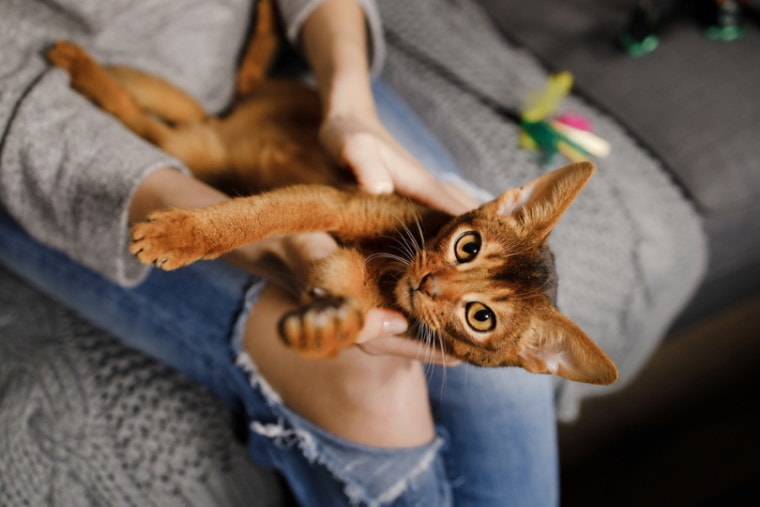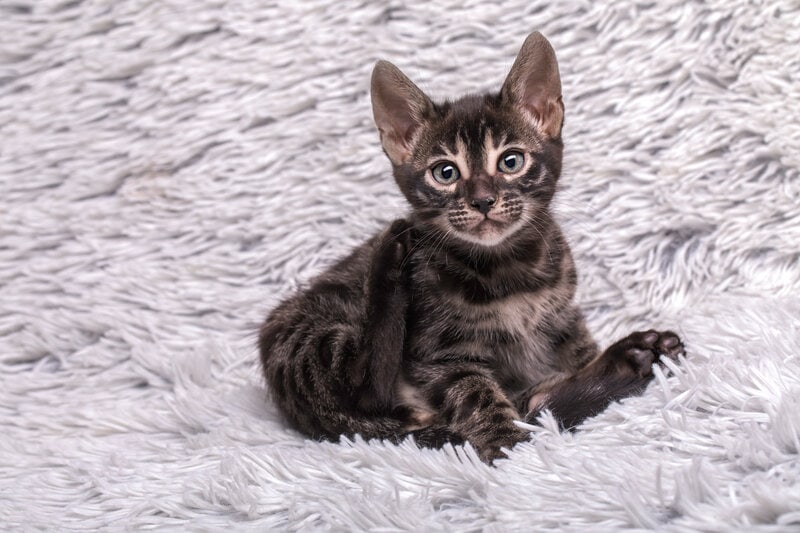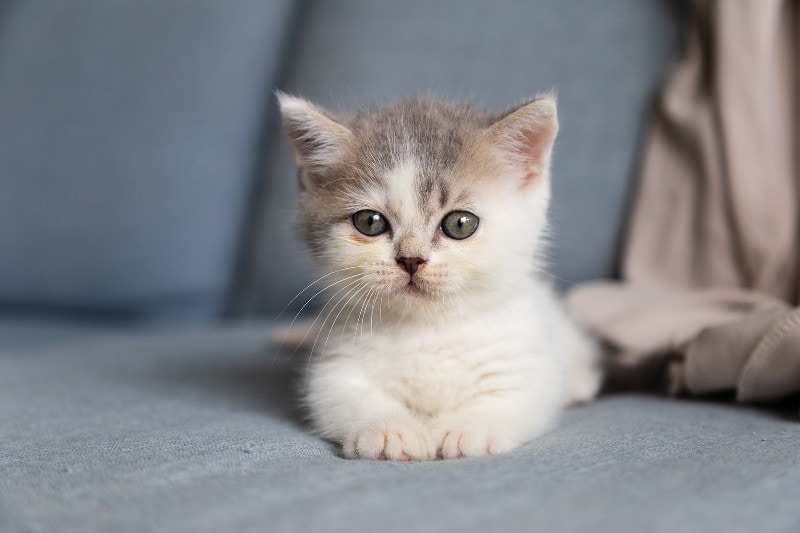
The sound of a cat purring while cuddled up next to you is one of the most relaxing sounds for any cat owner. But what about those adorable kittens? Have you ever wondered when kittens have the ability to purr? Kittens are typically able to start purring when they are just a few days old.
Here, we get into the whole purring thing: how it works, why cats do it, and why kittens start purring at such a young age.
Click below to jump ahead:
- How Does Purring Work?
- When Do Kittens Start Purring?
- Common Reasons Why Cats Purr
- How Can You Tell Why Your Cat Is Purring?
How Does Purring Work?
Purring technically starts with the brain sending signals to the cat’s larynx, otherwise known as the voice box, and this signal vibrates the muscles in the larynx.
As the cat continues breathing in and out, the air passes over these muscles, and this is what causes purring. The purring is also continuous because the muscles keep vibrating as your cat breathes.

When Do Kittens Start Purring?
Kittens begin purring when they are just several days old. The mother cats purr while in labor, and after their kittens are born, they purr before and during nursing.
Kitten development starts with the kittens being born blind and deaf, and by weeks one and two, they develop their sight and hearing. But until this time, they rely entirely on their mother.
The mother’s purrs help the kittens find their mother for nursing, but it also helps them feel safe and comforted. Purring forms a strong bond between them all.
Kittens start purring when they are just about 2 or 3 days old, which lets the mother know that her kittens are safe. By 3 weeks old, the kittens direct their purrs toward their littermates, and once they are weaned, that purring will eventually become directed toward you.
The 5 Common Reasons Why Cats Purr
There are more reasons that cats purr than you might expect, so let’s go over the most common ones.
1. Feeling Content
Giving your cat a few nice chin scratches or seeing them stretched out in a patch of sunlight is when you are most likely to hear your cat purring. A happily purring cat is by far the most common reason for purring. A contented purr is an automatic and natural response to the situation.
2. Being in Pain
When cats are injured or are in pain, you might hear them purring. This is a form of self-soothing, and one example of this is when mother cats purr while they are in labor.
Purring has also been shown to help with healing. It helps regulate breathing, and the low-frequency vibrations that purring produces are believed to stimulate healing. A study found that subjecting humans to similar low-frequency vibrations aided muscle strength and bone growth.
Cats purring when in pain is intentional rather than automatic, like with the happy purr.

3. Feeling Stress and Anxiety
Cats can be easily stressed out, and they have several different methods to deal with the stress, which sometimes include purring. Similar to when cats are in pain, purring can act as a form of self-soothing that helps them manage their anxiety.
Some cats will purr while panting or showing their teeth, which is definitely a sign of stress. But another obvious indication of a stress purr is its pitch.
Contented purrs are quite low in frequency, but stress purrs tend to be high in pitch. Like the pain purr, a cat will purr intentionally rather than automatically when stressed.
4. Wanting Something
When your cat is purring near you while you’re sitting in front of the TV when it’s close to their dinnertime, their purr is probably higher in pitch than usual. Since your cat is feeling some kind of impatience, the purr goes up in pitch, which is meant to add a sense of urgency to it.
A study played recordings of several different purrs, from low-pitched happy purrs to high-pitched purrs of cats wanting something. The subjects in the study all found the high-pitched purr to be more unpleasant, and they recognized the urgency behind it.

5. Greeting Other Cats
Many cats will purr when greeting another cat that they are familiar with. It’s thought that this is a way to let the other cat know that they are not a threat and can be trusted. You might have also noticed that cats purr while grooming each other. They are showing trust in each other in addition to purring from contentment.
How Can You Tell Why Your Cat Is Purring?
In most cases, it should be fairly obvious why your cat is purring. Listen to the pitch of the purr, and pay attention to the situation and behavior of the cat.
If your cat is purring while in the carrier in your car, they are likely stressed and attempting to self-soothe. Likewise, if your cat is in your closet because you have visitors and you can hear them purring at a high frequency, chances are that they are feeling anxious.
The happy purr is self-evident. Remember, the lower the purr, the happier the cat, but if the purr is higher, there might be something wrong.
If your cat is behaving differently than usual and has a high-frequency purr, your best bet is to consult your vet on the chance that there might be a problem. Even if it’s from stress, your cat might be having a challenging time dealing with anxiety issues.

 Conclusion
Conclusion
Overall, purring is essential for cats: It helps them and it can also help others. Some cats may snuggle next to someone who is ill and purr for hours. Cats also tend to heal faster than many other species. It helps them when they are experiencing anxiety or pain or because they want something.
Get to know your cat’s body language, as everything from the flick of their ears to how they are holding their tails can tell you what is going on in your cat’s head. The purring is just another layer of information for you to interpret and enjoy.
Featured Image Credit: dissx, Shutterstock







